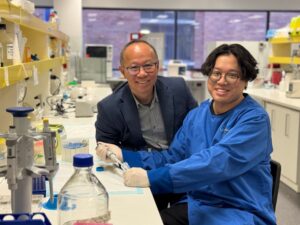
By Mikaela Seymour and Stefanie Vaccher
In 2023, a potential outbreak of sexually transmitted infections (STIs) among Pacific Australia Labour Mobility (PALM) Scheme workers in Townsville, Queensland, highlighted significant gaps in sexual health services for this group. The PALM Scheme, which facilitates temporary work in Australia for individuals from Pacific nations and Timor-Leste, has consistently shown that healthcare, particularly sexual and reproductive health, is a primary concern for both workers and employers.
Despite the importance of these services, little is known about the specific sexual health needs of PALM workers. This was underscored by a recent study, “STI and treponemal serology prevalence in a group of predominantly Solomon Islands PALM workers,” which investigated the outbreak and revealed critical insights into the health challenges faced by these workers.
Challenges in Addressing the Outbreak
The outbreak investigation faced unique challenges due to a lack of baseline data on STI prevalence in the workers’ countries of origin. Most available studies were conducted in antenatal clinics, which do not accurately represent the predominantly male PALM workforce. Without a baseline, determining the severity of the outbreak was difficult.
Moreover, PALM workers are not eligible for Medicare, complicating public health responses. A collaborative effort involving insurance providers, local healthcare services, and non-profit organizations was necessary to manage the outbreak effectively. This extensive collaboration is detailed in a project report supplementing the study.
High Participation and Demand
Despite these challenges, the response saw unprecedented participation, with 97% of workers volunteering for screening after receiving culturally appropriate education in their language. This high demand indicates a significant unmet need for sexual and reproductive health services among PALM workers.
“The high rates of participation and test positivity were unexpected and challenging to respond to,” the study noted, highlighting the complexity of interpreting syphilis blood tests due to genetic similarities between different strains of the bacteria.
Implications for Future Health Strategies
The findings have prompted several recommendations from the Queensland PALM Workers Health Working Group, including the potential implementation of preventive health screenings for PALM workers upon their arrival in Australia. Such screenings could reduce future STI presentations and health complications during their stay, though cost-effectiveness remains a consideration for health economists.
Concerns about reinfection upon returning to home countries have been raised, but preventive screenings could still benefit by reducing transmission within PALM cohorts and minimizing chronic infection impacts, such as infertility and congenital syphilis.
Broader Health Promotion Opportunities
Preventive screenings offer a chance to incorporate broader health promotion activities, including family planning and reproductive health education. These initiatives could provide ongoing benefits to workers and help bridge the gap in sexual health services.
PALM workers face many barriers to sexual and reproductive health care, justifying a tailored approach. Responding to these issues among PALM workers in our communities should be given priority.
Conclusion and Future Steps
As health insurers, employers, NGOs, and healthcare providers continue to promote sexual and reproductive health among PALM workers, it is crucial to pair educational efforts with accessible clinical services. The disproportionate burden of STIs and blood-borne viruses in the Pacific underscores the need for a proactive and comprehensive approach to health care for PALM workers in Australia.
This article first appeared on Devpolicy Blog, from the Development Policy Centre at The Australian National University, and has been republished here with permission. Dr. Mikaela Seymour and Dr. Stefanie Vaccher, the contributing authors, bring extensive experience in public health and epidemiology across the Pacific region.





